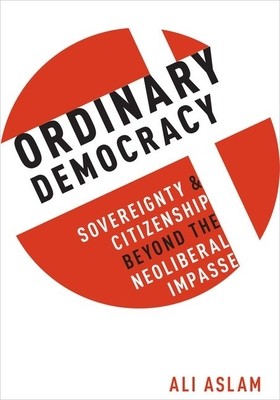
- We will send in 10–14 business days.
- Author: Ali Aslam
- Publisher: Oxford University Press, USA
- ISBN-10: 0190601817
- ISBN-13: 9780190601812
- Format: 15.8 x 23.6 x 2.3 cm, kieti viršeliai
- Language: English
- SAVE -10% with code: EXTRA
Reviews
Description
While various democratic theorists have looked at particular instances of recent social movements (Occupy or the Arab Spring, for example), none have yet attempted a more general theoretical take on what it is that relates all of these movements and what that running thread can tell us about democratic theory.
Ordinary Democracy argues that there is a commonality to these movements as well as a striking lesson about the nature of democracy, sovereignty, agency and solidarity today: in that these movements all highlight the ordinariness of neoliberal regimes and the ways in which citizens find solidarity and a sense of freedom in the marketplace. Ali Aslam contends that neoliberalism is more than a set of policies, ideological principles, or a distinct phase of capitalism-rather it constitutes the ways in which citizens think about their everyday lives. Conceived as common sense, it also governs what is permitted or forbidden in public discourse (for example, rendering issues of private debt a personal responsibility). Mass movements call attention to the effects of neoliberalism, providing a way to contest its acceptability; in doing so they help to contextualize the impasse that marks a language of civil empowerment and inclusion on one hand, and feelings of powerlessness, diminished agencyand impassivity on the other. In Aslam's view, democratic theorists who view participatory agency as offering the most authentic opportunity to satisfy the need for solidarity and freedom minimize the degree to which capitalism satisfies most citizens, as well as the depth of most people's affective attachment to neoliberalism. Looking in particular at Idle No More, Occupy Wall Street, Occupy Sandy, the Egyptian Revolution, and Strike Debt, Aslam takes what may be a more sobering, but still hopeful, view toward the potential of mass movements: to resist the normalization of conceptions of solidarity and citizenship under neoliberalism.
EXTRA 10 % discount with code: EXTRA
The promotion ends in 23d.22:54:04
The discount code is valid when purchasing from 10 €. Discounts do not stack.
- Author: Ali Aslam
- Publisher: Oxford University Press, USA
- ISBN-10: 0190601817
- ISBN-13: 9780190601812
- Format: 15.8 x 23.6 x 2.3 cm, kieti viršeliai
- Language: English English
While various democratic theorists have looked at particular instances of recent social movements (Occupy or the Arab Spring, for example), none have yet attempted a more general theoretical take on what it is that relates all of these movements and what that running thread can tell us about democratic theory.
Ordinary Democracy argues that there is a commonality to these movements as well as a striking lesson about the nature of democracy, sovereignty, agency and solidarity today: in that these movements all highlight the ordinariness of neoliberal regimes and the ways in which citizens find solidarity and a sense of freedom in the marketplace. Ali Aslam contends that neoliberalism is more than a set of policies, ideological principles, or a distinct phase of capitalism-rather it constitutes the ways in which citizens think about their everyday lives. Conceived as common sense, it also governs what is permitted or forbidden in public discourse (for example, rendering issues of private debt a personal responsibility). Mass movements call attention to the effects of neoliberalism, providing a way to contest its acceptability; in doing so they help to contextualize the impasse that marks a language of civil empowerment and inclusion on one hand, and feelings of powerlessness, diminished agencyand impassivity on the other. In Aslam's view, democratic theorists who view participatory agency as offering the most authentic opportunity to satisfy the need for solidarity and freedom minimize the degree to which capitalism satisfies most citizens, as well as the depth of most people's affective attachment to neoliberalism. Looking in particular at Idle No More, Occupy Wall Street, Occupy Sandy, the Egyptian Revolution, and Strike Debt, Aslam takes what may be a more sobering, but still hopeful, view toward the potential of mass movements: to resist the normalization of conceptions of solidarity and citizenship under neoliberalism.


Reviews